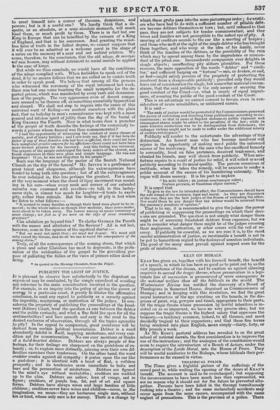PUBLICITY THE LIGHT OF JUSTICE.
IT is pleasant to observe how satisfactorily to the disputant an argument may be conducted, by the simple expedient of avoiding any reference to the main consideration involved in the question. For example, in an inquiry into the policy of giving the power of secregy to a particular court, it greatly facilitates the affirmative conclusion, to omit any regard to publicity as a security against the improbity, negligenoo, or inattention of the judges. In con- sidering the propriety of publishing the proceedings of the Insol- vent Debtors Court, treat the question as one between the debtor and the public curiosity, and what a fine field lies open for all the sentimentalities ! and how smooth and easy is the road to the desired exclusion of observation, through all the topics agreeable to pity! In the appeal to compassion, great assistance will be 'derived from certain habitual associations. Debtor is a word abundantly doleful in itself, implying misfortune, and every con- dition apt for commiseration. No one ever mentions or thinks of a hard-hearted debtor. Debtors are always people of fine feelings, for their feelings are sharpened on the grindstone of ca- lamity; or, to explain more distinctly, grieving over their own dif- ficulties exercises their tenderness. On the other hand, the word creditor creaks against all sympathy : it grates upon the ear like a gaol-door; it is identical with a heart of flint, a ruthless prosperity ; and its tendencies seem immediate to bolts and bars and the persecution of misfortune. Debtors are figured to the mind's eye without neckcloths ; creditors are wadded up to the chin. Debtors are sallow, lean of visage, sad in figure; creditors, of purple hue, fat, and of set and square forms. Debtors have always wives and. large families of little children ; creditors never have wives and childrens--never, in the imagination, we mean—they are barbarous single men, without kin or kind, whose only care is for money. There is a change by
•
which these grubs pass into the more picturesque order; for efedit- ors who have had to do with a sufficient number of pitiable debt- ors become debtors themselves in turn ; but, until reduced to that pass, they are not subjects for tender commiseration; and ther wives and families are not perceptible to the naked eye of pity. A meeting of creditors sounds to the ear like a meeting of harpies ; and those who melt at the sight of the single debtor who has brought them together, and who weep at the idea of his family, never think of the families of the debtors, or the possibility of the ruin which may be spread among them by the imprudence or miscon- duct of the pitied one. Inconsiderate compassion ever delights in single objects ; unreflecting pity abhors pluralities. For these reasons, the mere opposition of the words " debtor" and " credi- tor," and sufficient harping on " fortune"—mis, or broken, or sad, or bad—might satisfy persons of the propriety of protecting the insolvent from a disagreeable .publicity ; provided only they would leave out of consideration the single, but somewhat material circum- stance, that the said publicity is the only means of securing the good conduct of the Court—or, what is nearly of equal import- ance, of assuring the public of the good conduct of the Court. This is an advantage we cannot consent to forego, even in con- sideration of acute sensibilities, or unblurred names.
It is said- " The ends of justice would be promoted if the Commissioners possessed the power of restricting and directing these publications according to cir- cumstances; so that in cases of flagrant dishonesty public exposure and consequent shame might be added to the penalties of the law ; while in cases wherein misfortune was to be distinguished from dishonesty, the unhappy victims might not be made to suffer under the additional misery of undeserved disgrace." Publicity will render to the unfortunate the advantage of this distinction. An honest man who has become insolvent will rejoice in the opportunity of making most public the untoward causes of his insolvency. But the man who has sacrificed honesty to sensuality, lived on false pretences, deceived tradesmen, and cheated his friends, may well shrink from publicity. When mis- fortune repairs to a court of justice for relief, it will solicit or avoid publicity according to its moral quality. The person conscious of rectitude, when he takes the remedy, will be anxious to render a public account of the causes of his humiliating extremity. The rogue will desire secrecy. It is his part to implore
"Da mihi fallere ; da justum sanctumque videri ; Noctem peccatis, et fraudibus objice nubem."
It is urged that " To.give to the law its intended effect, the Commissioners should have the sole award of the sentence; legal and moral. As they are dispensers of the one, they, are the best judges of the fitness of extending the other. Nor could there be any danger that the debtor would be screened from the necessary penalties of opinion." That is to say, it is recommended to give the judges the power of publishing or suppressing the proceedings on which their deci- sions are grounded. The question is not simply what danger there might be of screening fraudulent debtors from exposure, but we are to consider what danger there might be of the judges covering their negligence, inattention, or other errors with the veil of se- crecy. If publicity be essential, as we are sure it is, to the most careful administration of justice, so inestimable a benefit is not to be put to hazard from regard to the feelings of sensitive individuals. The good of the many must prevail against respect even for the pride of misfortune.


























 Previous page
Previous page